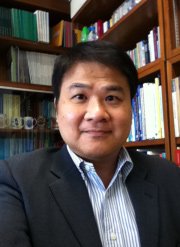Catering across the Board - Faculty of Science Meeting the Challenge of Knowledge Exchange
Knowledge exchange (KE) has become a core element at the faculty level. KE activities are embedded in all faculties at HKU, and indeed have been so for some time. Talking about translation and application of new knowledge to benefit society, you may not immediately associate it with basic science disciplines.
Knowledge exchange (KE) has become a core element at the faculty level. KE activities are embedded in all faculties at HKU, and indeed have been so for some time. Talking about translation and application of new knowledge to benefit society, you may not immediately associate it with basic science disciplines.
Our Faculty of Science recognizes that KE is a challenge, but also embraces it as an integral part of its knowledge mission. One of the Faculty's goals is to promote science literacy in society as a whole and it has been achieving this through a body of KE activities aimed at local secondary schools, industry and government, and the general public.
Each year the Faculty organizes dozens of activities that together attract thousands of participants from outside the University community.
Some of these result in a direct transfer of knowledge. In 2010-11, for example, statistics officials in Jiangsu provincial government received five days of training from the Department of Statistics and Actuarial Science, a programme that is held every year.
The Department of Earth Sciences trained 30 staff of the Hong Kong government's Civil Engineering and Development Department in applied geophysics last year, and contributed to a geology course to tour guides of Hong Kong's Geopark. The Department is also planning to offer a training course in aerial photographic interpretation.
Designated as a Regional Centre of Excellence in Marine Pollution by the United Nations(UN), the School of Biological Sciences has been commissioned by the UN's Partnerships in Environmental Management for the Seas of East Asia (PEMSEA) to conduct international training workshops on new technologies in marine environmental management for environmental professionals.
Other activities are aimed at increasing the public's general knowledge about science. "Making science knowledge accessible and understandable to the general public is a journey rather than a destination. We make it a long-term commitment with sustainable efforts," Professor W S Cheung, Associate Dean (Development and External Relations), says. Professor Cheung serves on the KE Working Group of the University as a representative of the Science Faculty.
For instance, 12 public lectures, seminars and dialogue session were organized in 2010-11 that featured Nobel Laureates and other distinguished speakers and covered a wide range of science topics such as carbon dioxide and global change, sustainable biofuels, the origins of Earth-like planets, and the universe's baby picture. More than 2,300 people attended these events.
The expertise of faculty members are highly sought after, especially by the media in cases where authoritative explanation of science is required, for example, after the earthquake and tsunami that happened in Japan on March 11, 2011.
Schools, of course, are also a key target in the Faculty's community engagement programme. Efforts are directed at sharing knowledge with teachers and providing opportunities for secondary school students to stretch their abilities.
In 2010-11 these activities included a training workshop for teachers on polymerase chain reaction, 17 programmes organized by the Faculty's Junior Science Institute to give secondary school students experience in laboratory work, field trips and workshops, and talks delivered to 60 schools and 5,000 secondary school students through the Talk@MySchool programme. Opportunities were also organized for gifted students, such as a 10-week course on harmonies in nature run jointly by the Department of Mathematics and the Department of Physics, in collaboration with the Hong Kong Academy for Gifted Education. The Department of Earth Sciences will develop an enhancement programme for gifted students and develop a web-based course on paleontology, which was commissioned by the Education Bureau of the HKSAR government.
"Apart from the KE activities organized at the faculty and departmental levels, our faculty members have numerous KE activities done at the professional level through talks, conferences, and contract research commissioned by external organizations. We are proud that many professoriate and support staff members of the Faculty engage in various KE activities on their own initiative," Professor Cheung says.
All told, the Faculty of Science's KE strategy is a good example to illustrate the breadth and depth of knowledge exchange that is being undertaken in HKU.


